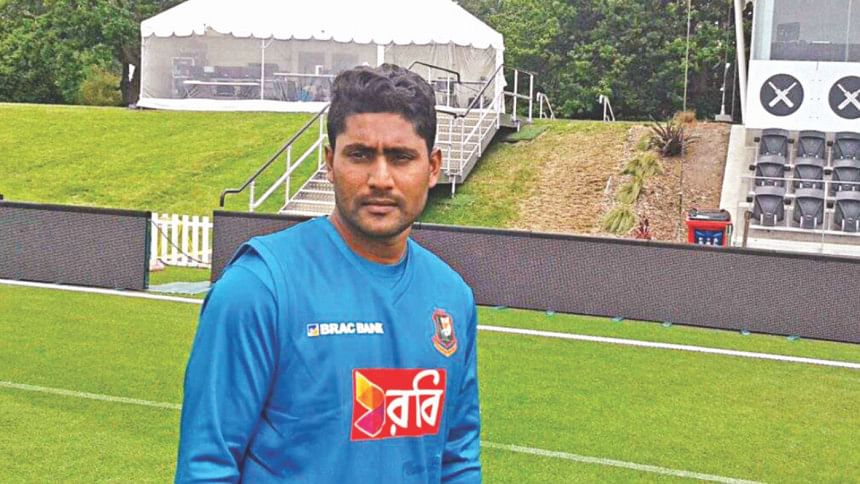Playing for the present

He is the opener who has been on the national scene for the last eight years, but he has played just 96 of the 224 matches Bangladesh have played across formats since his debut in October 2008. Imrul Kayes is Bangladesh cricket's comeback man -- with his status as Tamim Iqbal's opening partner almost always up for review. Although it is a reality that he has now become accustomed to, Imrul is riding a wave of success that makes his current stint in the national team seem set to continue for some time. The first Bangladeshi to score a century in New Zealand talked to The Daily Star's Sport Editor Al-Amin on the eve of today's first ODI in Christchurch. The following are excerpts from the interview:
The Daily Star (TDS): You are the first Bangladesh batsman to score a century in New Zealand (in February 2010). You have come a long way since that hundred. Isn't the memory still sweet for you?
Imrul Kayes (IK): When people say I have scored the first century in New Zealand it feels good. I was young then and could not understand a lot of things. Since then I have played a lot of matches and now I'm more matured and can act according to the conditions and the situation. But at that time I was very young and my only focus was to score runs to ensure my place in the team.
TDS: Wasn't it the 2015 World Cup where you really wanted to express yourself?
IK: It was a sudden return for me in the World Cup. I was actually not ready to play the World Cup. I was playing at home. So, when I got the call I had to rush. The conditions were completely different so I was not sure which shot to play and which to leave. That was one of the reasons I could not perform well in the World Cup. I also think that I was a bit unlucky because I was out to some very good deliveries.
TDS: You are in Christchurch where you scored 101 in 2010. How tough is it to score runs here?
IK: In such conditions you need to focus on every delivery you are facing. You can play shots once you are set in our home conditions. But in this kind of wicket you can never consider yourself set and play too many shots. In these conditions if you even score 50 or 70 you cannot think that you are set.
The wickets in New Zealand are different from the ones we have practiced on in Sydney. Here there is more lateral movement and you can see tennis-ball bounce. But as a professional player our job is to adjust to different conditions.
TDS: Your career in the national team is more chequered than others'. Your place as an opening partner of Tamim Iqbal has never been guaranteed.
IK: It has become normal for me that every time I go out in the middle I know if I don't play well today I might not be considered for the next series. I have become used to that scenario and I always keep telling myself that this is the way I will have to keep on playing for the national team. I do not regret that but sometime it comes to my mind that if I could have played a bit freely I could have score more runs.
TDS: Is this something the team management should have handled with a bit of care?
IK: It has nothing to do with the team management. The domestic structure has changed in Bangladesh. There is a lot of competition now and if a player doesn't perform another player will knock for that place. This is good for our cricket because it will help the players to improve on their performance. To be honest it is very difficult to stay in the team now without performing.
TDS: You have featured in a record partnership with Tamim in Khulna against Pakistan. Which innings do you consider your special one?
IK: Definitely I will rate my century against England [the first ODI in Dhaka in October this year] at the top because I knew if I failed to perform in that series my one-day career would be at stake. There was a lot of pressure and I think it was a crucial knock in my career.
TDS: And what about the Test series against England -- you played extremely well.
IK: I was really surprised with the wickets against England. Actually I never thought that we can prepare this kind of wicket, especially the one in Chittagong. Every delivery on that wicket was challenging, not just for playing shots but even for defending. We have never played in such condition at home before and I'm happy that we were able to cope with the difficult wicket. We were aware that we would have to play on this type of wicket so I have started batting on rough wickets four days in advance. And it helped us tremendously.
TDS: How do you react to the notion that you are the nearly man of the team?
IK: I am playing for the national team for eight years and I had to make five comebacks and still I'm not sure of my place in the team. It hurts sometime but I have accepted it. You can find players like me in other teams. They are not in the limelight but keep on contributing to the best of their abilities. Australia's Mike Hussey is the best inspiration for cricketers like us. He always maintained a low profile but to me he was one of the best players in world cricket.

 For all latest news, follow The Daily Star's Google News channel.
For all latest news, follow The Daily Star's Google News channel. 



Comments